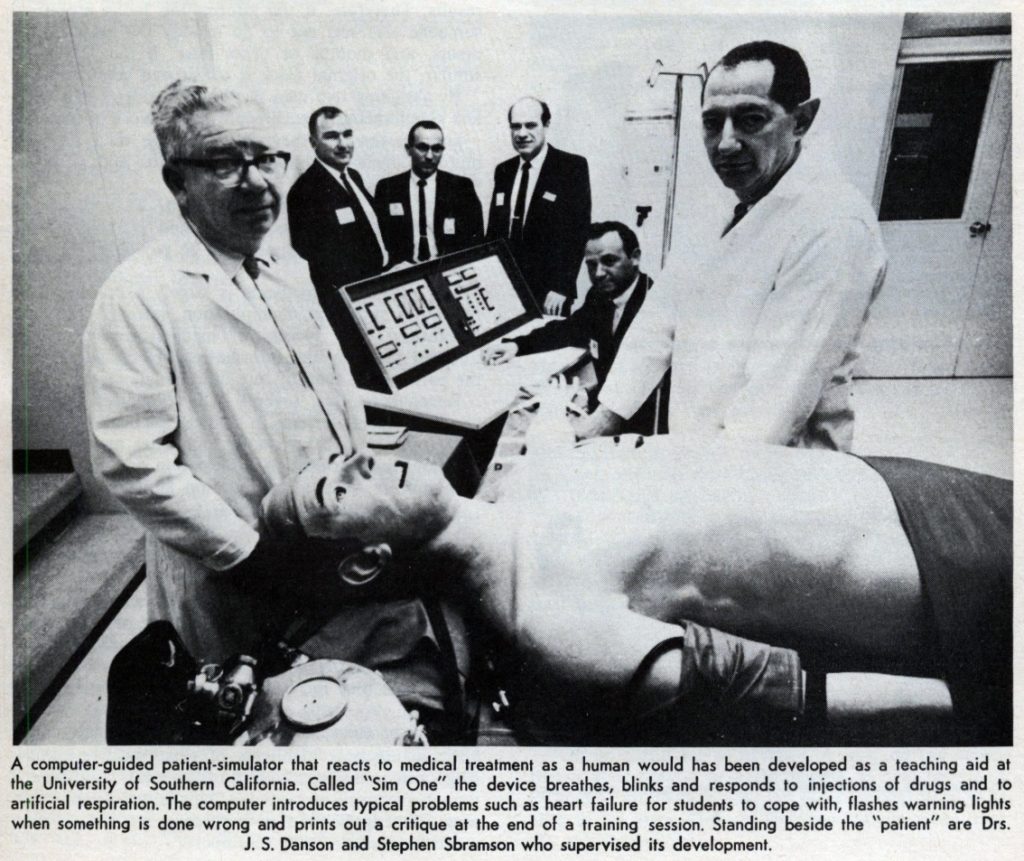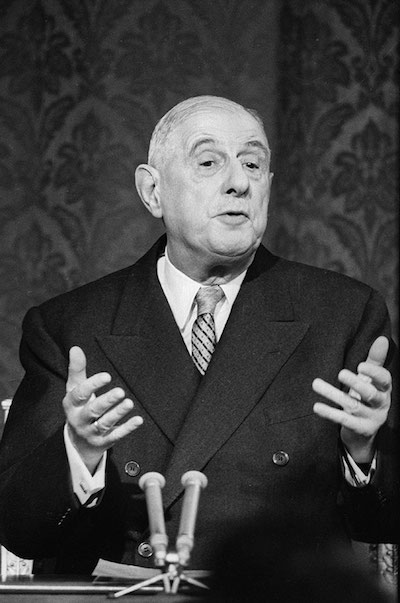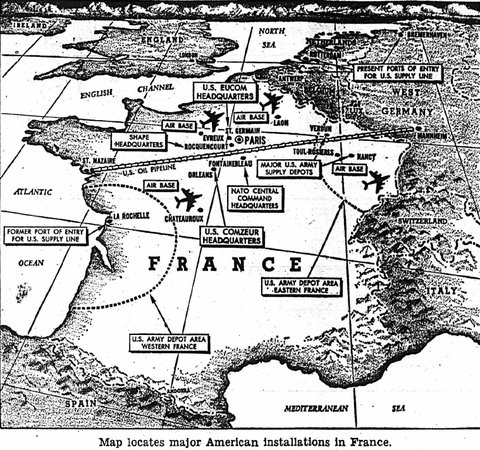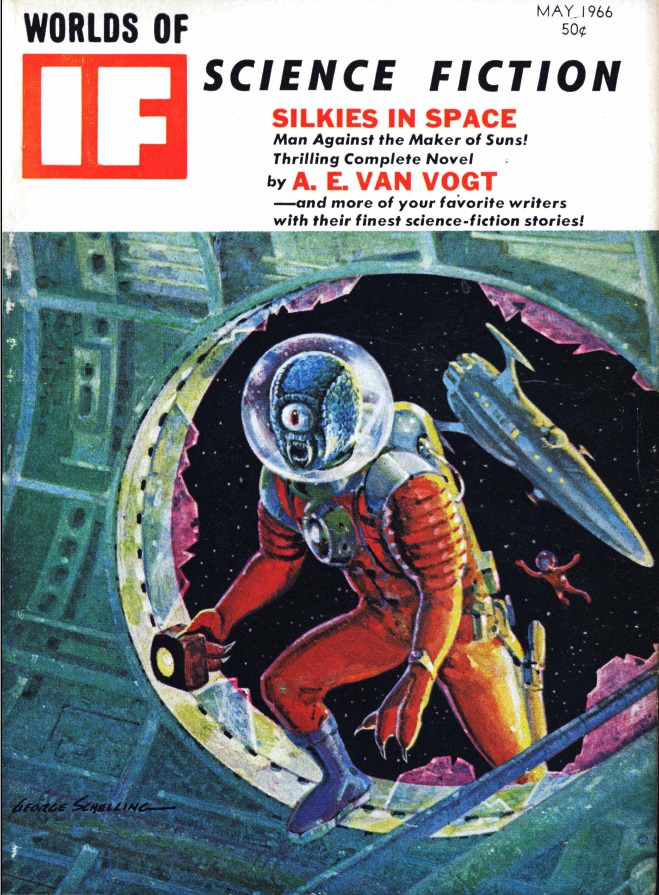
by Mark Yon
Scenes from England
Hello again!
After last month’s impressive resurrection of New Worlds, I’m quite intrigued this month to see whether editor Mike Moorcock’s vision of the future of British science fiction magazines can be upheld. Let’s go to the issue!

They say "sex sells". This may be the reason for this cover! Cover by Eduardo Paolozzi
This month’s “Leading Article” is one of those that examines an idea – not always related to science fiction, at least not at first. This month the connection seems obtuse, about creativity and theories of art by focusing on the work of Anton Ehrenzweig.

Again, I think we’re aiming at the new readers drawn to New Worlds by the Art Council rather than by science fiction.

Mind-bending Art meets Philosophy!
It does make you think, though, even if I feel that it is a little too introspective myself. I could be wrong, but this does not feel like a Moorcock editorial, but perhaps rather an Associate Editor Langdon Jones article.
Camp Concentration (Part 2 of 4) by Thomas M. Disch

Illustration by Zoline. This makes sense in the story, honest!
And so to the continuation of the big event story.
A quick recap. Conscientious objector Louis Sacchetti has been imprisoned in Camp Archimedes and given the task by prison commander Humphery Haast of observing other prisoners who are being experimented upon by Doctor Aimee Busk. The group are being given an experimental drug, Pallidine, which will hopefully improve intelligence.
We left the story last time where one of the prisoners, George Wagner, had become ill during a camp performance of Faustus. The group’s ringleader, Modecai Washington, had explained to Louis that the drug only gives them months to live.
Continuing this month, Louis, inspired by the revelation that the prisoners will die, is spurred on to write after months of writer’s block. George Wagner dies. There is a funeral. Sacchetti is admonished by Busk for using the prison library to do a little research of his own.
We discover that Pallidine is a spirochate bug, in actual fact the initiator of syphilis. In the past syphilis has been known to cause madness before death, something which Sacchetti is made very aware of. With this in mind, much of the story becomes increasingly bizarre as the effects of the virus on the infected person’s brain takes hold.
Mordecai’s infection is clearly very advanced and Louis spends much of the beginning of this story listening to Mordecai explaining how little time he has left and explaining how the cumulative effects of syphilis progress, in some vivid detail. This is emphasised by the point that Mordecai has three ‘familiars’ – rabbits infected with the disease – because the effects of Pallidine on rabbits are the same as humans, but happen much faster. (This also explains the strange pencil illustrations of rabbits seen over these two first parts.)
The intense intellectual discussions and the increasingly surreal events he experiences inspire Louis’s writing of a play entitled Auschwitz: A Comedy, which he describes as “fantastic”.
However much of the last part of the story describes Sacchetti’s observation of the prison performance of Faustus – a very odd, quasi-religious performance, involving camp commander Haast as a Messianic figure wearing a 'crown of thorns' made up from an electrocardiograph machine on stage. Before the performance reaches its ending though, Mordecai dies.
That night Louis has strange yet vivid dream of a conversation with Saint Thomas Aquinas. As a result, upon waking, he realises that he is as much of a prisoner as the other inmates.
Shocked yet? You’re meant to be.
In a lot of ways, this second part of the story continues what happened in Part One, but in understandably more extreme ways. The decay of the physical body and the brain, combined with the increasingly bizarre degeneration of the mind, is quite well done, although this means that much of the plot is pseudo-intellectual talk, lengthy yet meaningful diatribes and random navel-gazing. We have much talk of philosophers and art, alchemy, James Joyce and religion as the disease takes hold.
Consequently, I found that much of this part of the story was intellectual fluff and provocative imagery that, although interesting, did little to progress things. It was challenging and thoughtful, yes, but also long-winded and even a little dull. It felt more like a university philosophy lecture than anything else, rather like the author was showing off his knowledge rather than portraying anything of actual purpose.
Don’t get me wrong, Camp Concentration is still fascinating and often gripping, even as it becomes increasingly odd and remains incessantly downbeat. I’m still interested to see how this continues in the next issue. 4 out of 5.
The Green Wall Said by Gene Wolfe
And now a much shorter and simpler story from a new author to me, American Gene Wolfe. This is a story of aliens abducting humans to ask for help. I found it to be an interesting one in that I think it is written in a style that shows a slightly different take on what is now seen as British New Wave.
It is "cut-up", having two narrative threads running side-by-side, but more linear and more straightforward than say, the works of Disch and Ballard. As a result, it is more memorable for me. I like the ambiguity of the ending! I would be interested to read more from this writer. 3 out of 5.
Article: Language Mechanisms by Christopher Finch

This month’s ‘arty’ article (artycle?) examines the work of sculptor Eduardo Paolozzi, a person I was not aware of before reading this article but makes fascinating reading here. Paolozzi seems to integrate inspirations from wide-ranging sources such as writer William Burroughs, the Dadaism movement and philosopher Ludwig Wittgenstein, which fit right into the sort of material the magazine is currently writing about. Lots of pictures too, to illustrate.
I’d be interested to hear what other readers make of this as part of New Worlds though. Is this something that is genuinely new and adds to the magazine’s appeal, or is it instead a case of the artist disappearing into a self-imposed balloon of introspection? Putting it simpler: is it mind-blowing or just self-obsessed clap-trap with delusions of grandeur? And does it deserve a place in New Worlds? One I might need to think about more myself. 4 out of 5.
Kazoo by James Sallis
A new writer to me, writing here in a faux-hip style that seems both terribly new and yet terribly dated at the same time. Reminds me of Samuel R. Delany, William S. Burroughs and Anthony Burgess – deliberately, I think – with its made-up language and hipster-style prose.
It seems like a day in the life of Ferdinand Turnip, and uses John Lennon-eque turns of phrase to describe a set of strange events. Turnip is first attacked on an urban street, but then the two agree to have lunch. He then goes to the blood bank, joins in with a street band, (Guess what – he plays a kazoo) goes to his artist’s studio and drinks turpentine, then meets his partner Bella who breaks up with him. I’m fairly sure the last line is meant to be an ‘amusing’ double-entendre, but it’s difficult for me to tell, if I’m honest.
It’s OK as a stylistic piece, although tries too hard to be clever for me. But at least it is a little different from what all the other stories seem to be trying this month. One for the hip cats, which I am clearly not. 3 out of 5.

No, I don't know what this means, either!
Mars Pastorale, Or, I’m Fertile, Said Felix by Peter Tate
Allegorical tale about the self-aware growth of a plant juxtaposed with the story of Felix Jimpson, and his partner Velvet, recently arrived on Mars. I could be wrong, but it seems to be about the dichotomy between modern technology and nature on Mars.
Perhaps best summed up with a quote from the story: “What else is a poet or any other writer except a hedgehog trying to find a voice to yell at oncoming death?” which will either intrigue you or make you want to run for the hills. It is so ridiculous it makes me think that the story is meant to be satire.
Another deliberately obtuse, rather pretentiously symbolic tale. I may have read the satire wrong, but generally it seems to be trying too hard and worse, it feels like it has been done before. 2 out of 5.
Multi Value Motorway by Brian Aldiss

Another interesting experiment from Brian as he continues to channel his inner-Ballard. This feels like part of a story, more so when I realised that it involved Colin Charteris, who I last encountered in Just Passing Through, a story in the February issue of SF Impulse . It continues the idea that much of Europe has experienced psychedelic drugs as a result of Russia dropping hallucinogenic bombs in the Acid Head War. Last time it was about Charteris’s experiences of Western Europe. This time it is a splintered story of Charteris’s travels around the English Midlands, observing pop culture, teenagers, sex and motorway crashes creating art, and ending with Charteris becoming Saint Charteris, a god-like personality that is worshipped and adored. Perhaps best described as “If Aldiss wrote Ballard”, or perhaps more fittingly, “If Ballard wrote Aldiss”, as it is less cut-up than J.G.’s usual work.
Still intriguing, though, even if it feels like only part of a story. 4 out of 5.
Article: New Directions in Medicine by Brig.-Gen. Thomas H. Crouch
Another article, this time on how new science, often developed by the military, has led to innovations being taken up in the wider world.

Laser beams for surgery! Robotic prosthetics! Velcro closure tape! I found it interesting to read how new ideas are becoming generally available in the real world.
Science fiction is often seen as “the fiction that predicts the future”, and this article seems to confirm that (even if I think that it's not always true, myself!) I suspect that we will see most of these being commonly used in the future. 4 out of 5.
Concentrate 1 by Michael Butterworth
Michael Butterworth has appeared in New Worlds before, last time in October 1966 with The Steel Corkscrew. His work seems to be liked because it is different, and so is this. Concentrate 1 is more of a prose poem than prose or a poem, a mercifully short piece on – well, I’m not sure what. More seemingly disjointed ramblings, with some nicely written prose but deliberately no linear narrative. I understand that his writing is popular, but I still can’t shake the general feeling that the author wants to be Ballard and is not as good. This month’s “not for me” piece. 2 out of 5.
Book Reviews
The detailed review this month is by already-mentioned author Thomas M. Disch, of Harry Mathews’s Tlooth. (No, I hadn’t heard of it either.) Despite Disch’s claims that his enthusiasm for Mathews’s work borders on the “evangelical”, and his thoughtful and detailed analysis of this novel, I was less impressed. The book sounds very Disch-like, and I can see why he likes it, although I feel that it is not something I want to spend time with.
Brian Aldiss reviews Jeremy Seabrooks’s social history novel The Unprivileged. No, I’ve not heard of that one, either, but Aldiss seems impressed with the honest telling of the history of the Seabrook family from 1779, although it does sound to be filled with poverty, punishment and hardship.
Elsewhere James Cawthorn reviews Norman Spinrad’s story of cannibalism in The Men in the Jungle, Fritz Leiber’s “erotic interlude” The Wanderer, the “admirable” The Best from Fantasy & SF 16 and the “dull” Extrapolasis by Alexander Malec.

Summing up New Worlds
Another good issue on the new magazine that is New Worlds. Whilst John Sladek’s Masterton and the Clerks, advertised last month, hasn’t appeared, the Disch still impresses. It does not seem quite as strong as it started, but is still one of the most memorable stories I’ve read in years.
The rest seems to be settling down into this new format impressively. Science, art, philosophy – all are covered, although at the expense of fiction, perhaps. Regarding the fiction, I liked the Wolfe and can see how, like Disch and Sladek, this American author’s story may be influenced by this British New Wave.
However, many of the stories in this issue feel like variations of the same style, echoing Ballard and the like, and as a result the issue’s fiction is more demanding to read than many earlier issues, but less varied in style. Perhaps a little more worrying, what once gained traction by being new, original and shocking is now surprisingly less so, with the influence of Burroughs and Ballard looming large and throughout. It is clear that the editor and his assistants like what they publish – but do the readers?
As a reader, I can see that in future me not liking everything (or is that understanding everything?) in New Worlds is going to be a regular comment. However, at the moment there is enough to keep me better informed, interested and entertained – even if the new New Worlds feels more like a University magazine than an SF digest.
Until the next!


 l. New Governor-General Banja Tejan Sie. r. New Prime Minister Siaka Stevens.
l. New Governor-General Banja Tejan Sie. r. New Prime Minister Siaka Stevens. No one has ever seen the prison of Brass from the outside. Art by Vaughn Bodé
No one has ever seen the prison of Brass from the outside. Art by Vaughn Bodé
![[May 2, 1968] The Thing with Feathers (June 1968 <i>IF</i>)](https://galacticjourney.org/wp-content/uploads/2023/04/IF-Cover-1968-06-672x372.jpg)
![[July 28, 1967] The Shock of the New – Rabbits, Hedgehogs and Kazoos (<i>New Worlds</i>, August 1967)](https://galacticjourney.org/wp-content/uploads/2022/07/NW-September-1967-672x372.jpg)











![[April 2, 1966] Hidden Truths (May 1966 <i>IF</i>)](https://galacticjourney.org/wp-content/uploads/2021/03/IF-1966-05-Cover-659x372.jpg)



